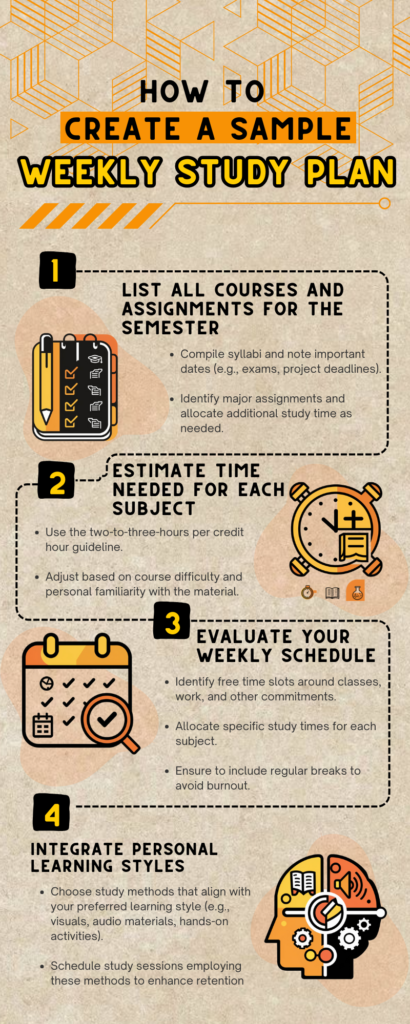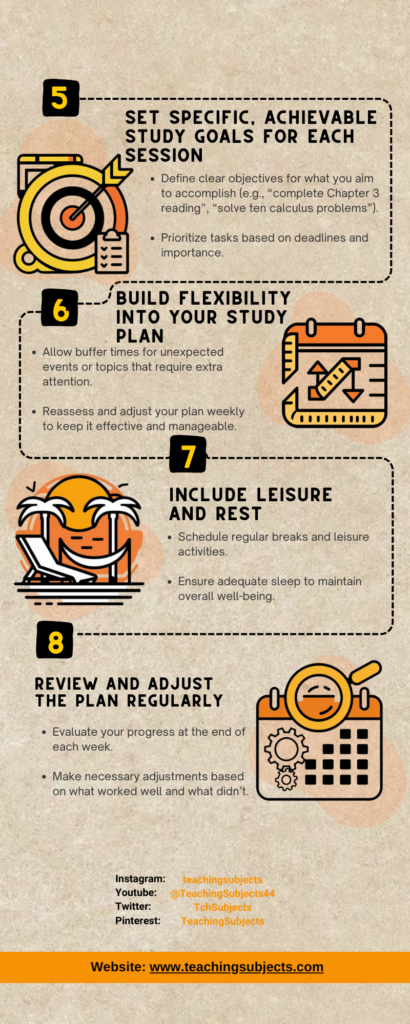Introduction
Effective study planning is crucial for college students as it directly impacts academic success and overall well-being. Properly managing weekly study hours as college students ensures that you cannot only grasp and retain course material but also avoid the stress and burnout that can come from last-minute cramming. This blog post will explore the importance of creating a balanced study schedule, the factors to consider when determining the number of hours to study each week, and practical tips for implementing a productive study plan. By the end of this post, you’ll clearly understand how to make the most of your study time and achieve your academic goals.
Understanding the Basic Formula
A general guideline for determining weekly study hours as college students is often based on the credit hours of the courses taken. A widely accepted formula is that students should spend about two to three hours studying for each credit hour they are enrolled in. For example, if a student is taking a 15-credit hour course load, they should plan to spend between 30 and 45 hours per week studying. This allows ample time to review lecture materials, complete assignments, and prepare for exams, creating a consistent routine reinforcing learning.
For instance, consider a student named Alex enrolled in a 4-credit hour Calculus course. According to the guidelines, Alex should dedicate 8 to 12 hours per week to studying for this class. This time would be divided among reviewing lecture notes, solving problem sets, and preparing for weekly quizzes. Implementing this structured approach helps Alex stay on top of the coursework and reduces the pressure from unexpected assessments or difficult topics.
However, several factors could influence this guideline. The difficulty level of the course, the student’s familiarity with the subject matter, and their learning style can all impact how much time is needed for effective study. Students balancing part-time jobs, extracurricular activities, or family responsibilities may need to adjust their study hours accordingly. Each student needs to assess their unique situation and make personalized adjustments to the general guideline to achieve optimal academic success without compromising their well-being.
Setting Academic Goals
Setting clear academic goals is fundamental for effective study planning and overall academic success. Academic goals provide direction and purpose, enabling students to focus on specific outcomes. These goals can be divided into short-term and long-term objectives. Short-term goals might include aiming for high grades on upcoming quizzes, completing assignments on time, or mastering a particular topic within a course. Long-term goals often involve achieving a desired GPA, graduating with honors, or gaining admission to a prestigious graduate program. Defining these goals helps students prioritize their tasks, allocate their study hours efficiently, and stay motivated throughout their academic journey.
Having well-defined academic goals can significantly influence the number of study hours a student dedicates each week. For instance, a student aiming to excel in a challenging course might need to invest more time studying and practicing problem-solving skills than a course they find easier. Additionally, students with ambitious long-term goals, such as gaining entry into a competitive field or program, might adopt more rigorous study schedules to ensure they meet the high standards required. Conversely, understanding personal limits and balancing academic commitments with other aspects of life is essential to avoid burnout. Therefore, setting realistic, achievable goals tailored to individual capabilities and circumstances is crucial for optimizing study time and maintaining a healthy academic and personal life balance.
Personal Learning Styles

Understanding personal learning styles is critical for optimizing weekly study hours and enhancing academic performance for college students. Learning styles can generally be categorized into four main types: visual, auditory, reading/writing, and kinesthetic. Visual learners process information best through images, charts, and diagrams, while auditory learners benefit from listening to lectures and discussions. Reading/writing learners prefer to engage with text extensively using notes and written resources, whereas kinesthetic learners thrive on hands-on experiences and practical applications. Students can tailor their study methods to be more effective and efficient by identifying their unique learning styles. This self-awareness enables them to develop strategies that cater to their strengths, ultimately making their study time more productive.
To identify one’s learning style, students can reflect on past learning experiences and consider which methods have been most successful. There are also various online assessments and questionnaires available that can provide insights into their preferred learning modalities. Once students understand their learning style, they can incorporate specific techniques that align with it. For example, a visual learner might need more time to create and review diagrams or examples to reinforce their understanding of concepts. They can benefit from using visual aids like mind maps, flow charts, and videos to study. In contrast, an auditory learner might find engaging in group discussions or listening to recorded lectures useful. Understanding and leveraging one’s learning style can significantly enhance the quality of study sessions, leading to better retention of material and, ultimately, academic success.
Creating a Sample Weekly Study Plan
Creating an effective study plan requires a structured approach and thoughtful consideration of one’s academic goals, time availability, and personal learning style. The process begins with listing all the semester’s courses and assignments and then estimating the time needed for studying each subject based on credit hours and course difficulty. Next, college students should evaluate their weekly schedule to identify consistent study times, including breaks and leisure activities, to prevent burnout. Building flexibility into the plan allows adjustments based on unexpected events or particularly challenging topics. Regularly reviewing and adjusting the study plan ensures it remains relevant and effective throughout the academic term.
How to Create a Sample Weekly Study Plan


Tips for Sticking to Your Study Plan
Sticking to a study plan requires consistency and discipline, foundational for achieving academic goals. Utilizing tools and apps, such as Trello, Google Calendar, or Todoist, can greatly assist in tracking and managing study time effectively. These digital tools help organize tasks and deadlines and provide reminders to stay on track. Regularly reviewing your plan and being open to adjustments based on your progress and feedback is essential. This adaptive approach ensures that the study plan remains effective and aligned with your evolving needs, enabling continual improvement and better time management strategies.
Conclusion
In conclusion, understanding your learning style is crucial to developing effective study habits that cater to your strengths. Creating a well-thought-out weekly study plan can significantly enhance your academic performance by ensuring that you are organized and prepared. Key steps include listing all courses and assignments, estimating the time needed for each subject, evaluating your weekly schedule, integrating personal learning styles, setting specific study goals, building flexibility into your plan, and including leisure and rest. Remember, sticking to your study plan requires consistency and a willingness to adapt. Start planning early and continuously adjust your plan to accommodate any changes or challenges you encounter. By doing so, you’ll not only improve your academic results but also maintain a healthy balance between your studies and personal life.
















